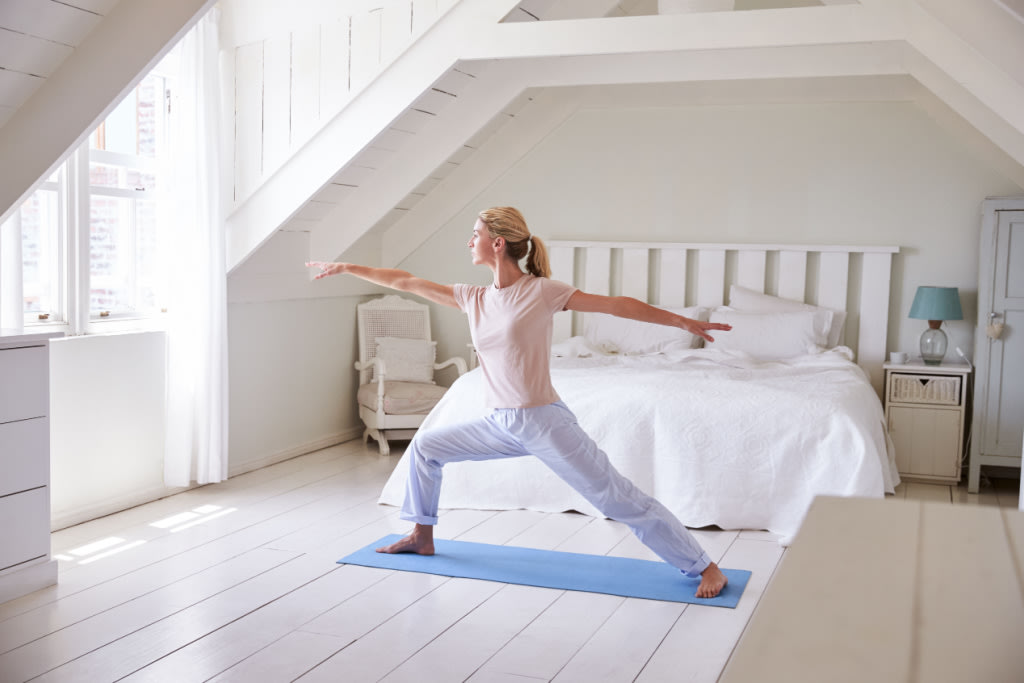9 Tips To Help You Become A Morning Person

October 16, 2023 - Updated October 16, 2023

Whether you’re a certified night owl who wants to stop hitting snooze or are simply looking for a way to get a bit more time back in your day, getting up earlier is one way to seize the day. But can you learn to become a morning person? And why is it that some of us can spring out of bed at 6 am while others dread the thought of starting their day before noon?
Each of us has a unique circadian rhythm - the 24-hour cycle that runs in the background to help your body with essential functions and processes such as your sleep-wake cycle, hormone levels and body temperature. Your circadian rhythm can also help you get a good night’s sleep, influencing when you feel ready for bed and when your body naturally wakes up.
One 2019 study analysed the circadian rhythms of almost 700,000 people, highlighting how genetics might play a critical role in when people go to bed. The researchers found that self-reported morning people and those with morning-linked gene variations went to bed earlier.
While some of us might be genetically predisposed to an ‘early to bed, early to rise’ lifestyle, what can those of us who feel a little more sluggish in the mornings do to seize the day when that first alarm goes off? And how can you learn to love the mornings?
Gradually shift your bed and wake-up times
First things first: no one goes from loving a sleep-in to becoming a member of the 5 am club overnight. If you’ve decided you want to become more of a morning person, you might want to start by gradually shifting what time you go to bed and what time you’re setting your alarm. Experts at the Sleep Foundation recommend you do this in 15-minute increments. So if you currently get up at 7.30 am, start setting your alarm for 7.15 am for a couple of days. Then, move to 7 am and continue the cycle until you’re getting up at your ideal time.
Create a relaxing bedtime routine
It’s important to create a bedtime routine that helps signal to your brain that it’s time to go to bed. We know how important a consistent and relaxing bedtime routine is for children, so why aren’t we prioritising it as we get older?
The American Heart Foundation has the following tips for improving your sleep with a bedtime routine:
Set an alarm to remind you when you want to go to bed or to begin your routine so you have a consistent bedtime every night
If you feel stressed, unwind with some mindfulness or journaling
Avoid screen time before you go to bed, and opt for a book if you need an activity that will relax your body and mind.
… And develop a morning routine that you love
From an extra 20 minutes reading your book, finding the time to start your day with a restorative walk, squeezing in a workout or simply enjoying your morning coffee in peace before the rest of the house wakes up, there’s probably a very good reason you want to wake up earlier. If you don’t have one, it’s a good time to find it.
Getting up earlier can be hard, so make it easier for yourself by understanding your motivation and creating a morning routine that will ensure you wake up on the right side of the bed. Adding some feel-good habits to your mornings will help you get more out of each day and boost your wellbeing, especially if you’re dedicating that extra time to self-care, a workout or whatever makes you feel good. So once you’ve decided on your new wake-up time, figure out what you’re going to do with the extra time that’s back in your diary and enjoy it.

Think about what you’re putting into your body - and when
Ever found yourself regretting that afternoon coffee when you’re struggling to get to sleep? Us, too. The Sleep Foundation recommends avoiding caffeine within six hours of bedtime. If you’re wanting to get up earlier, they also suggest shifting your mealtimes. If you love a late-night dinner, you might find you need to bring it forward to support your bedtime routine and morning plans.
Don't hit snooze
We’ve talked about the downsides of hitting snooze before. Those extra few minutes of shut-eye will typically lead to you waking up feeling even drowsier than you did when that first alarm went off. If you struggle to rise with the first alarm, try putting your alarm out of arm’s reach. That way, you’ve got to get up to turn it off and are far less likely to head back to sleep.
Have your phone in another room
In the habit of doomscrolling before bed? It’s time to break it. While spending time on your phone might seem like a harmless habit, Cleveland Clinic highlights that using your phone before you go to sleep can have a pretty negative impact on your sleep. From providing a stimulant your body doesn’t need before bedtime to the blue light throwing off your circadian rhythm, there aren’t many benefits of having your phone on your bedside table if you can’t stop reaching for it. Basic alarm clocks are incredibly cheap, so you don’t need to rely on your phone for your morning wake-up call either!
Try a sunrise lamp
A sunrise or wake-up lamp is an alarm clock that mimics a sunrise, triggering your internal body clock and helping you to wake up more easily. The process (which often includes gentle sounds as well as the light sensation) generally starts 30-60 minutes before your wake-up time, allowing your body to gradually realise it’s time to get up.
An article from the University of Washington draws attention to a few of their benefits, saying these types of lights mimic and promote a sleep schedule that’s more in line with what our ancestors followed. However, they might work better in climates, seasons or rooms that don’t get much natural sunlight in the mornings.
Embrace the light (and the dark!)
One of the reasons that sunrise lamps are growing in popularity is that light is one of the strongest cues to guide your body’s natural rhythms. A study from 2019 demonstrated how light at the wrong time can disrupt circadian rhythms and the prevalence of artificial light in modern society, particularly during the evening, can impact sleep. So hit the dimmer switch when you’re winding down for the evening and head outside to embrace the sunlight when you first wake up.
Get a workout in
No matter what time of day you prefer to train, regular exercise can definitely help to improve the quality of your sleep and support your goal of becoming a morning person, with a 2019 study finding that exercising first thing in the morning can help to shift your body clock earlier. Don’t stress too much if you’re someone who prefers to train later in the day. Research has also found that evening exercise helps to improve sleep quality, just make sure you’re wrapping up your training session over an hour before you hit the hay.
Find someone to train with
If you’re hoping to become someone who works out in the morning, finding a friend to train with can make things easier and create a sense of accountability. Having a workout buddy can keep you motivated, on track and stop you from bailing when you’re considering skipping that session to get some more shut-eye in.
Consistency is key
When it comes to good sleep hygiene practices, consistency is key. Sleep is so important to helping you maintain your overall health, and prioritising a good night’s sleep and a consistent routine is the first step to take if you want to become a morning person.

A more empowered you starts with Sweat, and our editorial team is here to bring you the latest fitness tips, trainer recommendations, wellbeing news, nutritional advice, nourishing recipes and free workouts.
* Disclaimer: This blog post is not intended to replace the advice of a medical professional. The above information should not be used to diagnose, treat, or prevent any disease or medical condition. Please consult your doctor before making any changes to your diet, sleep methods, daily activity, or fitness routine. Sweat assumes no responsibility for any personal injury or damage sustained by any recommendations, opinions, or advice given in this article.
Wellbeing